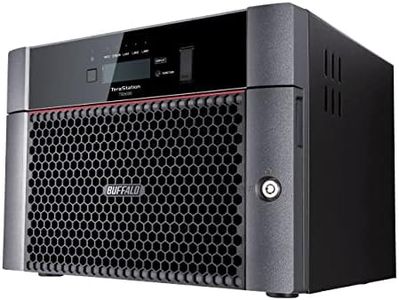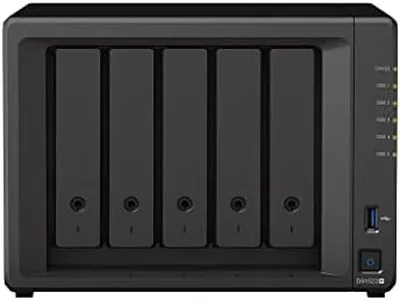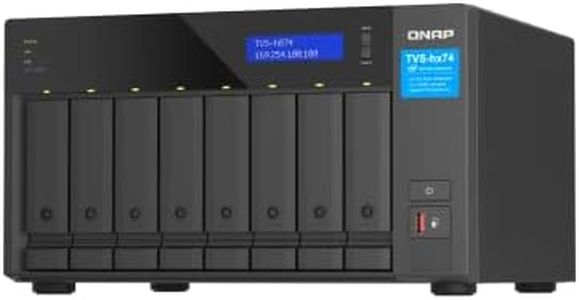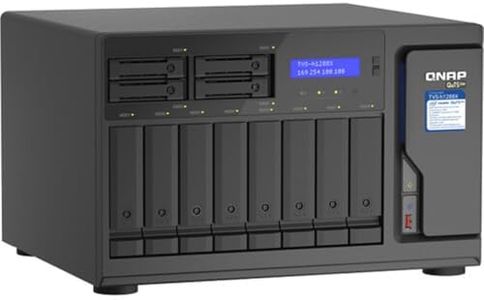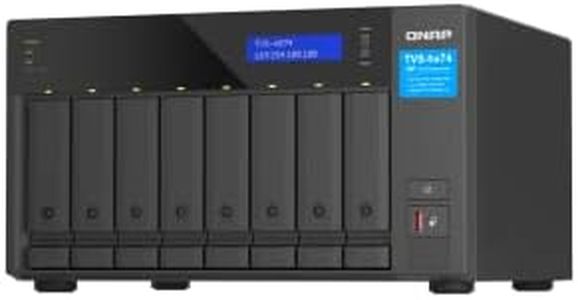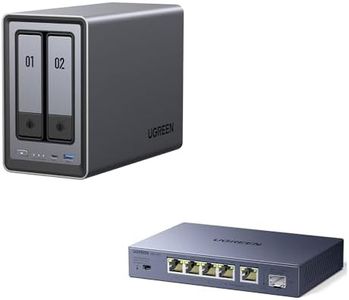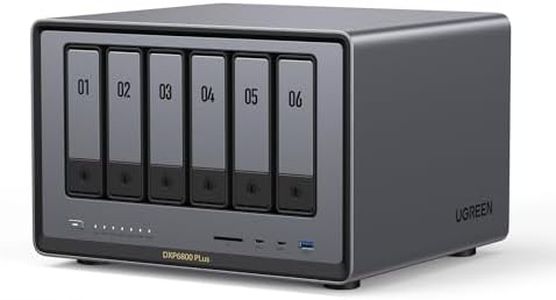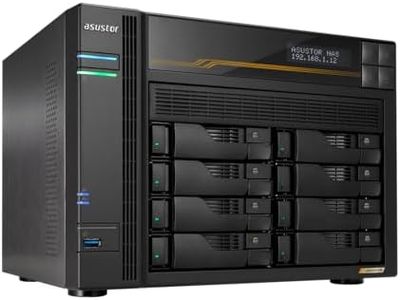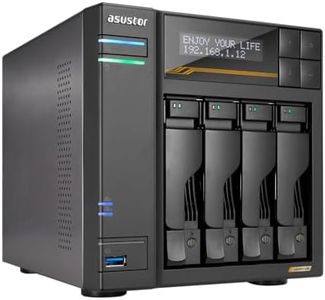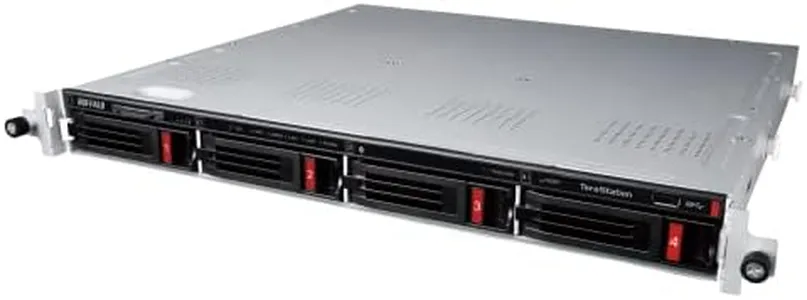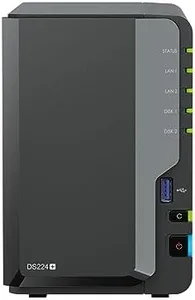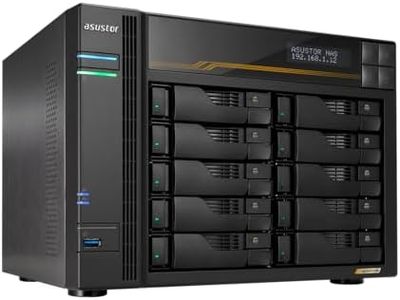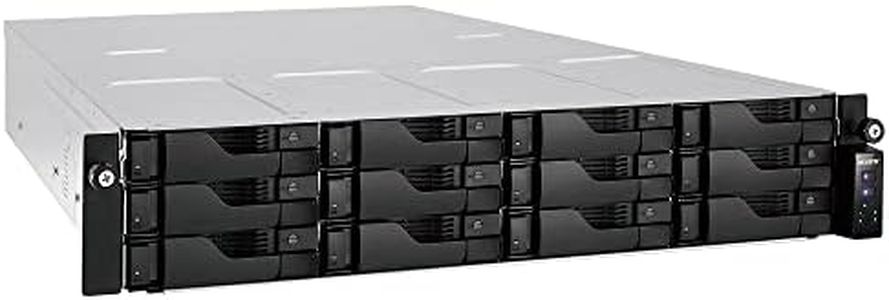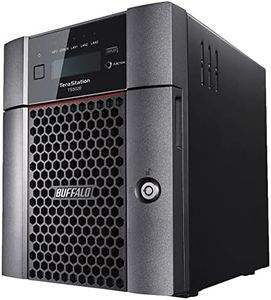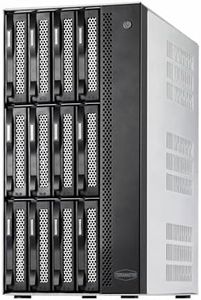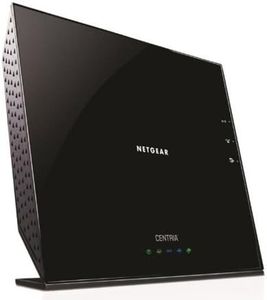10 Best Nas Servers 2026 in the United States
Our technology thoroughly searches through the online shopping world, reviewing hundreds of sites. We then process and analyze this information, updating in real-time to bring you the latest top-rated products. This way, you always get the best and most current options available.

Our Top Picks
Winner
BUFFALO TeraStation 5820DN 8-Bay Business Desktop NAS 160TB (8x20TB) with Hard Drives Included RAID iSCSI Network Storage File Server
Most important from
3 reviews
The BUFFALO TeraStation 5820DN is a solid choice for businesses needing a large and reliable network storage solution. It comes with 8 bays, each preloaded with 20TB NAS-grade hard drives, giving you a massive raw capacity of 160TB. Configured in RAID 6 out of the box, it offers about 120TB of usable space with good data protection, which is ideal for critical business data. The device supports RAID configurations, allowing flexibility depending on your needs for speed or redundancy.
Its hardware is designed for stability and security, featuring a closed system with 256-bit encryption and two-factor authentication to protect sensitive files. The built-in snapshot feature helps with quick backups and recovery, which is useful in preventing data loss from accidental deletion or ransomware attacks. Another standout is the native 10GbE Ethernet port that supports very fast file transfers without needing additional hardware upgrades, beneficial for environments with heavy data traffic.
In terms of compatibility, it works well across Windows, Mac, and Linux systems, making it versatile in mixed-OS offices. Cloud integration with services like Dropbox and Amazon S3 enables hybrid backup strategies for extra data safety. The unit is fairly large and weighs about 31.5 pounds, and while power consumption and noise levels aren’t explicitly detailed, business NAS devices like this typically balance performance with reasonable energy use and quiet operation. The 5600 RPM hard drives are optimized for NAS use but might be slower than higher RPM drives for some intensive tasks. If you need a high-capacity, secure, and business-focused NAS with strong data protection and fast network connectivity, the TeraStation 5820DN is a dependable option best suited for medium to large businesses looking for a robust desktop NAS without having to separately buy drives.
Most important from
3 reviews
Synology DS1522+ 5-Bay DiskStation NAS (AMD Ryzen R1600 8GB Ram 4xRJ-45 1GbE LAN-Port) 5-Bay 40TB Bundle with 5X 8TB Seagate IronWolf
Most important from
51 reviews
The Synology DS1522+ is a solid choice for anyone needing a reliable 5-bay NAS server with a total storage capacity of 40TB, thanks to the included 5x 8TB Seagate IronWolf drives. Its AMD Ryzen R1600 processor paired with 8GB of RAM makes it well-equipped to handle multiple users and demanding applications without slowing down. With four Gigabit Ethernet ports, it offers good network connectivity options for home offices or small businesses aiming for stable and fast data transfers.
The system supports different RAID configurations, helping protect your data by distributing it safely across the drives or providing backups against drive failure. Synology’s software is a strong point here, offering easy access, syncing, and sharing of files from various devices, along with built-in features to secure your data through backups and privacy controls.
The NAS is designed with efficiency in mind, but it weighs nearly 20 pounds and might produce some noise under load due to its mechanical drives and cooling needs. For those seeking a dependable NAS with plenty of storage and solid performance for file sharing, backups, or running small business applications, the DS1522+ stands out as a worthy option. However, if quieter operation, lower power consumption, or compatibility with very high-speed networks like 10GbE is a priority, other models may be better suited.
Most important from
51 reviews
QNAP TVS-h874X-i9-64G-US 8 Bay High-Speed Desktop NAS with 12th Gen Intel® Core™ CPU, 64GB DDR4 RAM, 10GbE & 2.5 GbE Networking and PCIe Gen 4 expandability (Diskless)
Most important from
90 reviews
The QNAP TVS-h874X-i9-64G-US is a powerful 8-bay NAS designed for users who need fast, reliable storage with plenty of room for expansion. It comes diskless, allowing you to choose your preferred hard drives, supporting large storage setups. The 12th Gen Intel Core i9 processor combined with 64GB of DDR4 RAM offers strong performance, making it well suited for heavy multitasking, virtualization, and demanding file operations. Dual M.2 NVMe SSD slots help speed up access by enabling SSD caching.
Connectivity is a standout feature here, with dual 10GbE and four 2.5GbE ports, plus multiple USB 3.2 Gen 2 connections, which means transfers and backups can happen very quickly compared to typical NAS devices. This is ideal for users working with large media files or extensive backup tasks. The system supports RAID configurations, which protect your data in case of drive failures and add flexibility depending on your needs. It also includes business-friendly features like cloud backup, virtual machine support, and ransomware protection through snapshots for data safety.
The device features 4K video playback and transcoding with HDMI output, making it a good choice for media professionals or enthusiasts who want to stream content directly. While it's a bit on the heavier side (17 pounds) and likely consumes more power and produces more noise than simpler NAS models, this trade-off comes with the benefit of high performance and expandability. This NAS is well suited for advanced home users, small businesses, or creative professionals who demand speed, capacity, and robust data protection.
